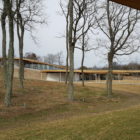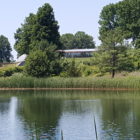Around Town
Grace Farms Withdraws Re-Filed Permit Application, Opening Questions About Long-Term Operation
|
An attorney on behalf of Grace Farms this week withdrew the organization’s re-filed application for a special permit. In a short letter to the town planner dated Feb. 5, attorney Ted O’Hanlon of Stamford-based Robinson+Cole said that Grace Farms looks forward “to working with you on the implementation and enforcement” of an existing special permit, approved last fall by the Planning & Zoning Commission with 100-plus conditions. Coming on the heels of a contentious P&Z hearing where several neighbors complained that Grace Farms already has violated that existing permit in many ways, the withdrawal raises new questions about just what set of rules the Lukes Wood Road organization will operate under in the long term. According to a lawsuit filed by neighbors Timothy Curt and Dona Bissonnette of Smith Ridge Road, the post-hearing legal notices of P&Z’s decision last year were “defective, incomplete and misleading” and also failed to meet the requirements of state law and the town’s own zoning regulations.


